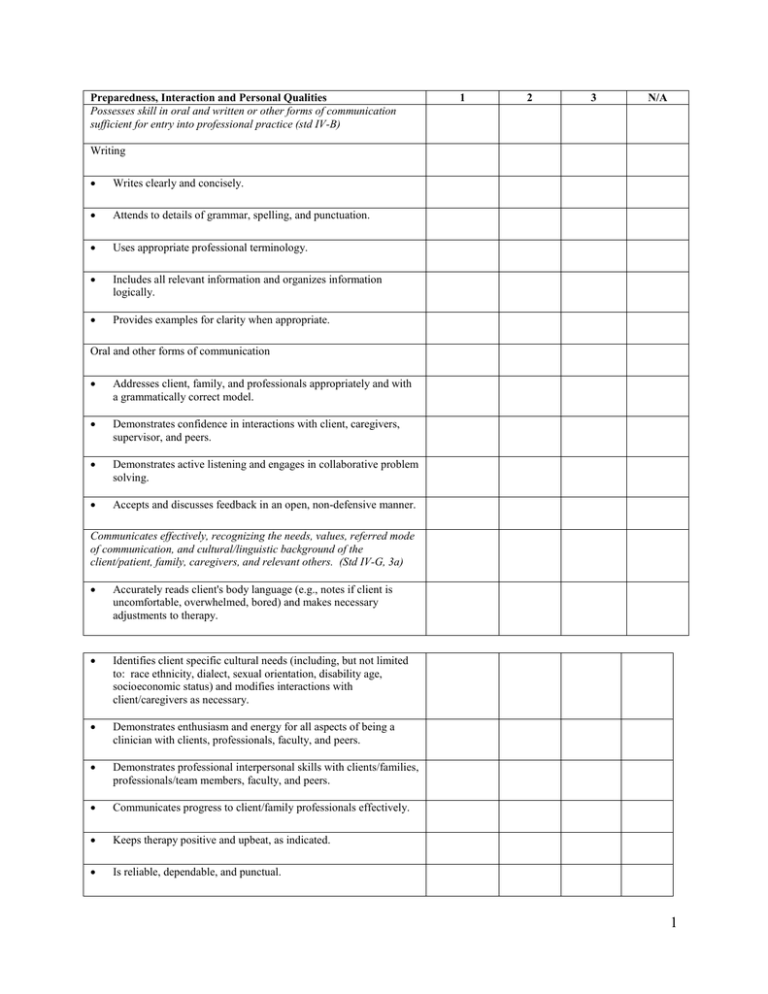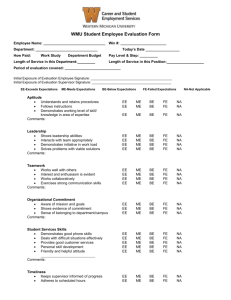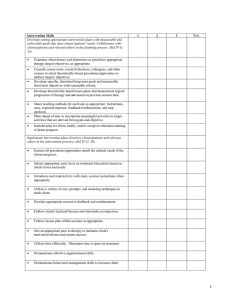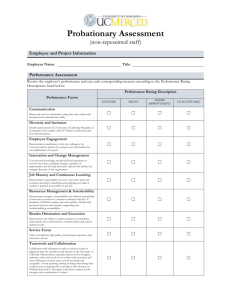Preparedness, Interaction and Personal Qualities 1 2 3
advertisement

Preparedness, Interaction and Personal Qualities Possesses skill in oral and written or other forms of communication sufficient for entry into professional practice (std IV-B) 1 2 3 N/A Writing Writes clearly and concisely. Attends to details of grammar, spelling, and punctuation. Uses appropriate professional terminology. Includes all relevant information and organizes information logically. Provides examples for clarity when appropriate. Oral and other forms of communication Addresses client, family, and professionals appropriately and with a grammatically correct model. Demonstrates confidence in interactions with client, caregivers, supervisor, and peers. Demonstrates active listening and engages in collaborative problem solving. Accepts and discusses feedback in an open, non-defensive manner. Communicates effectively, recognizing the needs, values, referred mode of communication, and cultural/linguistic background of the client/patient, family, caregivers, and relevant others. (Std IV-G, 3a) Accurately reads client's body language (e.g., notes if client is uncomfortable, overwhelmed, bored) and makes necessary adjustments to therapy. Identifies client specific cultural needs (including, but not limited to: race ethnicity, dialect, sexual orientation, disability age, socioeconomic status) and modifies interactions with client/caregivers as necessary. Demonstrates enthusiasm and energy for all aspects of being a clinician with clients, professionals, faculty, and peers. Demonstrates professional interpersonal skills with clients/families, professionals/team members, faculty, and peers. Communicates progress to client/family professionals effectively. Keeps therapy positive and upbeat, as indicated. Is reliable, dependable, and punctual. 1 Reschedules canceled therapy sessions. Maintains professional appearance. Collaborates with other professionals in case management. (Std IV-G, 3b) Follows up on questions/concerns/comments/requests by supervisor and/or other professionals. Carries out assignments in a professional manner. Participates in discussion regarding practicum with supervisor and other instructors by asking questions, listening, and initiating topics for discussion. Requests assistance from supervisor and/or other professionals when appropriate. Uses professional communication and reporting skills for case management (e.g., in medical rounds and IEP meetings). Meets paperwork deadlines. Keeps appointments with supervisor and other professionals or cancels appointments in a timely manner. Demonstrates ability to be a team player. Provides counseling regarding communication and swallowing disorders to clients/patients, family, caregivers, and relevant others. (Std IV-G, 3c) Educates clients, patients, families, and caregivers to "help prevent communication or swallowing disorders, minimize their effects and sequelae, and facilitate normal development" (ASHA, 2004). "Addresses the personal and environmental factors that are barriers to or facilitators of the patient's/client's communication or swallowing" (ASHA, 2004). Adheres to the ASHA Code of Ethics and behaves professionally. (Std III-E, IV-G, 3d) 2




